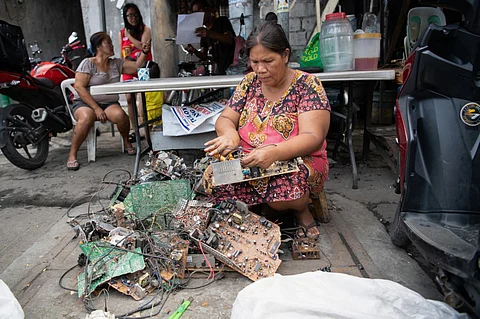
- NEWS
- the EDIT
- COMMENTARY
- BUSINESS
- LIFE
- SHOW
- ACTION
- GLOBAL GOALS
- SNAPS
- DYARYO TIRADA
- MORE

Dexter Barsigan has spent the past 13 years making a living with his bare hands and a pair of pliers, stripping scrapped laptops and air conditioners for metal he can sell to junk shops in the Philippines.
But since his hands began aching and his vision started to blur three years ago, there have been days he can only watch his wife and nephew do the job for him.
The 47-year-old father of three is a “mambabaklas,” the Filipino word for informal dismantlers who scavenge electronic waste for the nickel, aluminum and copper inside.
“Dismantling helps us put food on the table. It provides the money to send my kids to school,” Barsigan told AFP while sitting along a kilometer-long stretch of Onyx Street, home to hundreds of fellow “e-waste” dismantlers.
Their work frequently involves burning away rubber wire casings, releasing a toxic brew of chemicals including lead, mercury and cadmium into the air.
Both the Philippine government and the Basel Convention, a global waste management treaty signed by 191 countries, consider e-waste hazardous.
“It poses serious threats to human health and the environment,” said Irvin Cadavona, a hazardous waste management officer with the environment department, citing health risks ranging from cancer and neurological diseases to respiratory illnesses and birth defects.
The World Health Organization said last year that exposure to e-waste chemicals can lead to incidents of asthma and reduced lung function in children, while pregnant women are at higher risk for stillbirths and premature delivery.
“It’s very hard to recycle these (chemicals). When you dismantle (e-waste), you must intricately break it down. It can be very hazardous,” Gelo Apostol, an environmental health specialist from Ateneo de Manila University, told AFP.
Exposure to the substances can lead to anemia, kidney and thyroid diseases, and nerve damage, he said.
The Philippines is among the top e-waste generators in Southeast Asia, according to the United Nations’ Global E-waste Monitor, accounting for 540 million kilograms (about 600,000 tons) in 2022.
Dismantlers who work at the country’s accredited facilities are required to follow stringent guidelines.
But their informal counterparts lack the training, regulations and protective equipment needed to properly protect themselves.
“I strongly believe that some Filipinos are getting sick because of the exposure to e-waste,” Cadavona said.
Barsigan, who doesn’t wear a mask while working, prefers dismantling computer circuit boards with aluminum and copper because they fetch as much as P470 ($8) per kilo.
